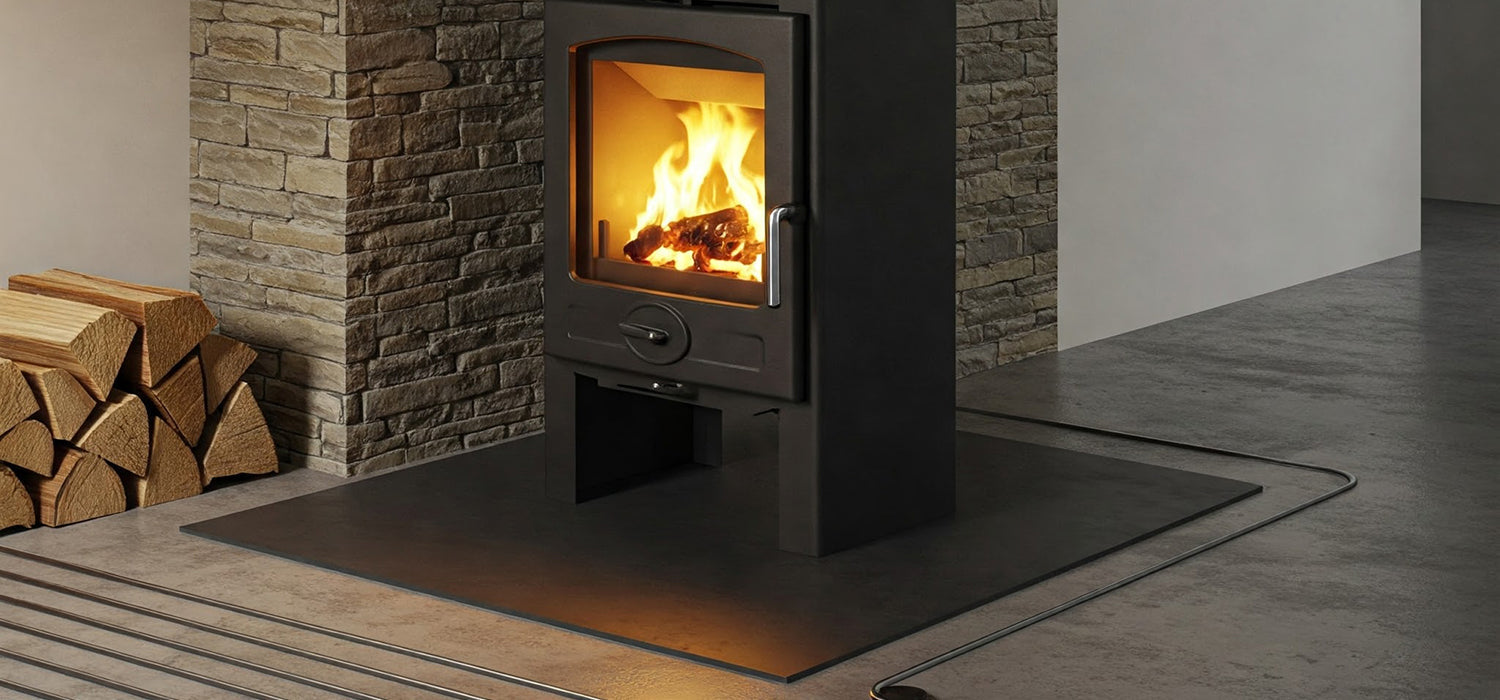
Log Burner Law UK: The Complete Guide for Homeowners
Love the cosy crackle of Log Burners? Here’s the short answer: yes, you can still use them in the UK—but only if you follow strict laws on fuel, stoves, and smoke. Stick around to learn the rules, avoid fines, and keep your fires guilt-free.
Log Burner Law in the UK: A Guide to Regulations
Picture this: it’s a damp winter evening, the wind’s howling outside, and you’ve just lit your stove. Bliss. But before you sink into your armchair with a cuppa, there’s something worth knowing. The UK has tightened up its rules on wood burners.
It’s not about spoiling the fun—it’s about cutting down on harmful smoke and keeping our air clean. These laws affect the stoves we buy, the fuel we burn, and even which postcodes can host a roaring log fire without breaking the law.
Let’s break down the essentials, starting with the biggest change of all: Ecodesign.
The Ecodesign Law (A Guide for Stoves)
From 2022, all new stoves on the market must meet Ecodesign standards. Think of these as the “clean air” badge of honour for modern log burners.
These stoves are built to burn more efficiently, release fewer particles into the air, and save homeowners from wasting money on fuel. They also tend to give off more heat for less wood, which is a win all round.
If you’ve got an older stove, don’t panic—it’s not banned. But when the time comes to upgrade, you’ll be steered towards an Ecodesign model. It’s like trading in an old diesel banger for a modern hybrid—you’ll still get from A to B, but with far less smoke.
The Law on What You Can Burn (The "Ready to Burn" Scheme)
We’ve all made the mistake of throwing damp wood on a fire and then wondered why the room looked like a Victorian smog scene. That’s exactly what the government wanted to stop.
Since 2021, fuels for home stoves fall under the “Ready to Burn” scheme. This means logs must have less than 20% moisture, and bagged coal has been phased out.
Here’s what’s in:
-
Kiln-dried wood
-
Seasoned wood that’s been dried properly
-
Smokeless fuels and certain briquettes
And here’s what’s out:
-
Wet logs
-
Painted or treated timber
-
Household rubbish (yes, people really did this)
The scheme makes sure that every bag of firewood sold with the logo burns cleaner and hotter. It’s better for your stove, your chimney, and your neighbours’ lungs.
Smoke Control Areas and DEFRA-Exempt Stoves
Here’s where things get a little more postcode-specific. Across many towns and cities, there are Smoke Control Areas.
If you live in one, you can’t just light up any old stove. Only DEFRA-approved appliances and approved fuels are allowed. These stoves are specially tested to produce far less smoke, even in built-up areas where air quality is already under pressure.
Failing to follow the rules could mean fines. Councils take this seriously, so it’s worth checking your local authority’s website before stocking up on logs. Think of it like this: if you’re in a smoke control zone, a DEFRA stove is your golden ticket.
How to Ensure Your Log Burner is Legal
So, how do you keep enjoying your fires without stepping out of line? It’s not as complicated as it sounds. Follow a few simple steps and you’ll be safe, legal, and ready to relax.
A Simple Checklist for Compliance
-
✅ Install only Ecodesign stoves if you’re buying new
-
✅ Burn fuels marked Ready to Burn
-
✅ Check whether you live in a Smoke Control Area
-
✅ Always hire a certified installer
-
✅ Keep your paperwork—installation certificates matter
-
✅ Book an annual chimney sweep and stove service
If you can tick these boxes, you’re already ahead of the game.
Where to Find More Information on Your Local Laws
Rules can change depending on where you live, so it’s always worth checking:
-
Your local council’s website (they publish Smoke Control Area maps)
-
The official DEFRA site (lists approved stoves and fuels)
-
Government updates on Ecodesign standards
And if you’re unsure? A quick call to your council’s environmental health department can save you a nasty fine later.
The Consequences of Breaking Log Burner Laws
Let’s get to the bit nobody likes—penalties. Ignoring the rules doesn’t just affect the environment, it can hit your wallet too.
Here’s what you could face:
-
On-the-spot fines of up to £300
-
Court prosecution with penalties up to £1,000
-
Orders to remove a non-compliant stove altogether
And don’t forget the social cost. Neighbours aren’t shy about reporting smoky chimneys, especially if they’re in a clean-air zone. Prevention really is better than cure.
So the message is simple: play by the rules, and you can keep your fires burning bright without the stress of legal trouble.
Final Thoughts
Owning a log burner in the UK is still perfectly legal—but only if you do it responsibly. That means installing the right stove, burning the right fuel, and knowing what applies in your local area.
Yes, the laws have tightened, but they’re there to make sure everyone gets to enjoy clean air while we enjoy cosy fires. With a bit of care, you can still have the warmth and charm of a log burner without the worry.
And really, isn’t that the whole point? A warm home, a glowing fire, and peace of mind that you’re doing things right.
Other content we think you'll love
- What Are the New Log Burner Rules in the UK?
- Why Your Log Burner is Smoking: Causes, Fixes, and Safety Tips
- Why Does My Log Burner Smell?
- Why Your Log Burner Is Burning Too Fast (And How to Fix It)
- Why Does My Log Burner Keep Smoking? Common Causes & Fixes
- Why Your Log Burner Won’t Stay Lit (and How to Fix It)
- Why Is My Log Burner Smoking? Causes, Fixes & Prevention
- Can You Safely Put a TV Above a Log Burner?
- Keeping Your Baby Safe Around Log Burners
- Can You Safely Install a Log Burner Near Glass?
- Why Your Fireplace Smells Like Burning Plastic (and What to Do About It)
- Log Burner Carbon Monoxide: Stay Safe from the Silent Killer

